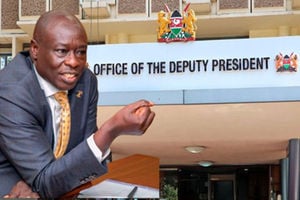Isiolo Swahili poet falls on hard times
Isiolo Swahili writer Waqo Abdi Waqo displays some of his books during an interview with Nation.Africa in Isiolo town on March 2, 2021. He has been struggling to put food on the table and appeals for help.
For lovers of Swahili poetry, Waqo Abdi Waqo is not a new name.
Besides contributing in the Taifa Leo’s poem section and letters to the editor for years, Mr Waqo has also written three books, one for primary learners and two for secondary students.
His love for the Swahili language and passion for poetry was inspired by the late prolific novelist Ken Walibora’s analogies in his works, including the Siku Njema novel, which is full of imagery and lyrical language.
Mr Waqo, who hails from Tuluroba in Isiolo, was at one time trolled online after his four-stanza poem Mogoka Iharamishwe – calling for a ban on miraa, which was published in Taifa Leo – trended online.
“He (Walibora) inspired me with his work and I developed an interest in writing Swahili poems and never thought a newspaper with national circulation would publish them,” Mr Waqo said in an interview with the Nation.
Immediately he completed his secondary education in 2013, Mr Waqo enrolled for a primary teaching course at a college in Embu County, and a media course, which ran concurrently.
He, however, dropped out due to lack of fees.
Disappointed
Efforts to raise money to support his college education ran aground, forcing him to seek casual jobs to assist his parents provide for the family. However, he kept alive his dream of one day becoming a recognised writer in Kenya.
The zeal to publish was so much that in 2016 he spent the entire year working on his first book, Dafina ya Insha, which got published after six months of rejection by some of the leading publishers.
“They refused to publish on grounds that the book’s content was not satisfactory. I was disappointed but I later made changes to my work,” he said.
All this while, the 26-year-old had no money with which to publish. He entered into a deal that earned him Sh100 for every Sh500-book sold.
Though he earned little from the first 1,000 copies that were published in 2017, the 224-page book for Standard Six, Seven and Eight pupils endeared him to younger readers.
Under the same agreement, he later published a guide to Tumbo Lisiloshiba and Mwongozo wa Kigogo, both selling at Sh300 and originally done by Said A Mohamed and Pauline Kea respectively.
Waqo Abdi Waqo, Swahili writer from Isiolo, shares his story with Nation.Africa in Isiolo on March 2, 2021. He has been struggling to put food on the table and appeals for help.
His mother, who was the family’s sole breadwinner, fell ill the same year he published the books and most of the money he got from the sales went to her medical bills.
“I sold a lot of books in 2019 and saved some cash but used all of it to pay for my mother’s hospital expenses until she died in February 2020,” Mr Waqo said terming the death among his lowest moments in life.
Unexpectedly, after the burial of his mother, Mr Waqo and his three sisters, two in secondary and one in primary school, were ejected out of their home at Kiwanjani near the Isiolo International Airport, forcing them to rent a single room at Tuluroba.
“Life became unbearable as I was the sole breadwinner to my siblings and sales had dipped due to Covid-19, which saw schools shut for nine months,” he recalled.
Throughout the year, he struggled to pay rent and foot bills.
He tried reaching out to local leaders for help to no avail.
The writer, who is celebrated across northern Kenya for his contribution to promoting the Swahili language, says his friends no longer take his calls.
“I have talked to some leaders to get support to publish thousands of books to sustain subsequent printing but they have been engaging me in cat and mouse games,” he said.
Each book costs him at least Sh200, with the minimum required publishing at 1,000 copies, meaning he needs at least Sh200,000 to take his work to the press.
Mr Waqo, who hopes to publish at least 10 books in the next five years, is nearly completing his first novel Hangaiko la Guyadho, which tells of the struggle between love and tradition after a Muslim girl falls in love with a Christian boy.
While he still struggles to put food on the table, he maintains that support to publish and access to subsidised printing services would go a long way in helping him publish more books at a lower cost.
“It hurts me seeing my sisters sleep on empty stomachs. Many people think I have a lot of money,” he laments.
Though assistance seems not forthcoming, he still clings to hope.
“I am worried that my talent could go to waste, but I am hopeful that my star will glow again.”





